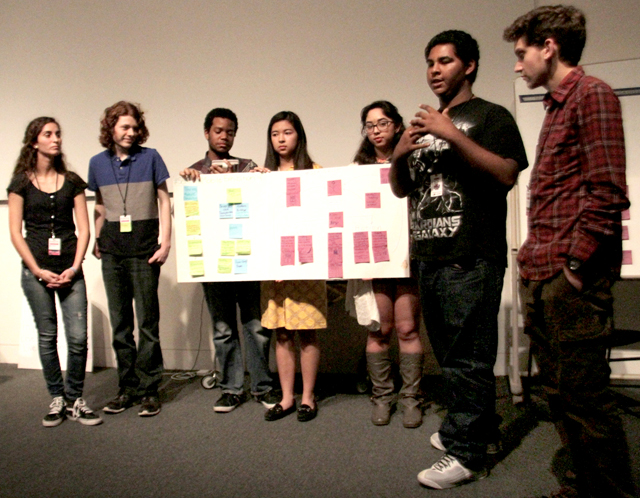
FilmGate showcases students’ solutions to South Florida challenges
At the Learn.Do.Share. workshop hosted by FilmGate Interactive this weekend, team “Raise The Earth” presented their ideas to make South Florida more of a place where people are motivated to take sustainable actions. The ideas presented by (left to right) Amy Molina, Tristan Calay, Teiheim Edwards, Sarah Engel, Meyling Yi, Brian Martinez, and Steven Espinoza will be incubated for the next 12 months by FilmGate. Photo by Jenna Buehler.
Just how Miami Beach will survive amidst projected sea level rise is one of the thorniest issues affecting the island city. Last week, 30 teens from across South Florida brainstormed solutions as part of Learn Do Share, a multimedia workshop series that was part of the transmedia conference FilmGate Interactive. RELATED LINKS
“‘Jacqueries’ and Cerveza de los Muertos” on Knight Arts blog by Neil de la Flor, 02/09/15
“Filmgate: Inspiring Miami filmmakers to create” on Knight Arts blog by Neil de la Flor, 01/21/15
Run by Columbia University, Learn Do Share. is a design workshop that helps prototype interactive solutions for global challenges.
“The work that we do is about creatively solving problems that communities face by finding ways to involve youth as part of that process,” said co-founder Lance Weiler. “It takes a lot of people to attack complex, wicked problems and at Learn Do Share. we are empowering youth to collaborate on ideas and implement prototypes for change.”
To help build an inventory of questions to solve, Learn Do Share participants took a field trip to Miami Beach’s Art Deco Welcome Center. There, photojournalist Jake Price guided them through the broader implications of sea level rise via a tour of his exhibit “The Invisible Season.” Students witnessed the beauty and devastation left behind by the 2011 tsunami that hit Japan as well as several hurricanes in the U.S. The stories helped students think creatively about exploring new ways to cope with future events at home.
Students also walked around Miami Beach, identifying which areas could be submerged in the future, according to projections from the National Weather Service. With that experience, students began to develop prototypes for ways communities can address these problems.
To introduce students to the prototype process, and to help build a judgement-free idea zone, students were given 20 sticks of spaghetti and a marshmallow, then were asked to collaborate on building a freestanding structure.
As a second prototype, students experimented with the process of “bodystorming,” a design research technique. Students chose to identify as a technology, an app, or a place. Learn Do Share. organizers then became different groups of people across various industries who would interact with that subject or topic. As a result, students developed and, in a way, beta tested their new ideas for sustainability, simulating their potential impact on users across various sectors.
Students presented their solutions on Sunday evening, following a disclaimer from Weiler: the workshop is meant to foster the idea process and not to create final solutions, he said.
Student groups took the stage with posters in-hand.
“The question we asked was, how can we educate and motivate people to live a more sustainable lifestyle,” said student Meyling Yi, as she introduced her team’s project.
Yi’s team, Raise the Earth, planned to sponsor a mobile “sustainability and the arts” bus that would travel the country to connect people with films, poetry and performances related to the consequences of sea level rising. The van would serve to both archive and raise awareness of what actions and impact has been witnessed across the country. The team also introduced an idea for an app called SeaUsRise, which would connect users with the archive and offer an opportunity for collaboration and a continued conversation online.
Weiler closed out the presentations with an announcement that all attendees would be asked to list the ways they can contribute to turning these ideas into reality.
“The seeds of the idea are throughout,” Weiler said. “And moving forward, we want to continue to grow this environment where youth are the mentors that bring communities together to collaborate on solutions.”
Over the course of the next year, FilmGate will volunteer to help each student team incubate and implement their prototypes. The results of their work will be presented as part of next year’s FilmGate Interactive experience.
Jenna Buehler is a Miami-based freelance writer.